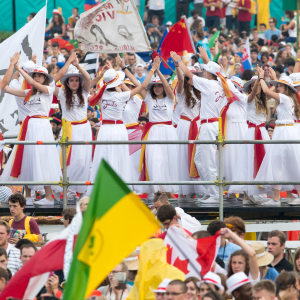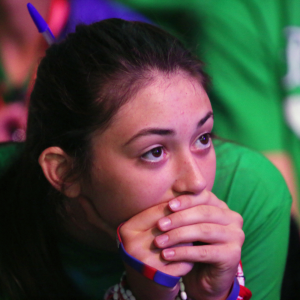Hundreds of thousands of young Catholics from across the globe gathered in Poland on Tuesday under clouds. The sky was overcast, it was raining and they could hear thunder as they gathering in Krakow’s Blonia Park for the beginning of World Youth Day.
But there was another, even darker cloud. Just hours before the opening liturgy was about to begin news filtered through that an elderly priest in France, Fr Jacques Hamel had his throat slit by Islamic extremists while saying Mass.
The news sent shockwaves through the gathering - an event which could be likened to the Church’s equivalent of a political party conference or convention where hundreds of bishops mingle with young Catholics at fringe events.
Those experiencing the greatest shock were the 35,000 young French pilgrims who are now adjusting to living in a country where Islamic terrorist attacks are becoming the norm. Up until recently the slaying of Christians has been something that happened in the Middle East and Africa but now it has taken place on European soil and in France the country known as “the eldest daughter of the Church.”
In Krakow, Fr Benoit de Menou, a priest from Grenoble, told me: “The young people here are very emotional. They can’t understand it and they don’t know what to do. They had always lived in a secure, peaceful environment and now violence is coming all around them.”
The 36-year-old priest works promoting vocations for the French bishops and at World Youth Day was managing their vocations “stall” at the Cracovia Stadium.
“Fr Hamel was a simple man. He was not one of those heroes but an ordinary person, like an older brother,” he added. “You don’t want super priests.”
He said it was possible that the death of Fr Hamel might inspire more men to become priests in the future while others here in Krakow say his killing should help wake the west up from its indifference to faith and suffering Christians.
“It certainly shakes us out of our complacency, it gives lie to the attitude that says ‘well it couldn’t happen here,’ ” the Archbishop of Baltimore, William Lori, whose played a key role in the United States on defending religious liberty. “It should also increase in us a sense of genuine human solidarity with those who are suffering in Iran, Iraq, Syria and parts of Africa.
For Cardinal Sean O’Malley, the Archbishop of Boston and one of Pope Francis’ advisers, those who are killed for their faith should act as an inspiration - he pointed out that in Krakow, Poland there is a rich example of how faith has flourished despite the totalitarian regimes of communism and fascism.
“The Church has always been persecuted that’s not something new,” he said. “In fact in recent years the numbers dying for their faith has multiplied all over the world, in particularly in Africa in the Middle East and now we see it in Europe. And very often it is a question of “Odium Fidei" it’s hatred for the faith that’s causing them to be in harms way.”
To be killed out of hatred for the faith is how the Church defines martyrdom and many in Krakow are saying that Fr Hamel, slain while saying Mass, is already a martyr. And to be be killed at the altar is a rare event: it happened in Krakow to St Stanislaus in 1097 and to Archbishop Oscar Romero in El Salvador in 1978.
But while there is shock at what happened in France on Tuesday, World Youth Day continues to be a celebration of faith: an event emphasising love, hope and reconciliation.
By the end of the Mass on Tuesday a sunset was peeping through the clouds as people sang, waved flags and danced in the city’s squares. On Wednesday morning French pilgrims seemed in good spirits and were walking through the city waving their flag and singing the La Marseillaise.
Pope Francis’ arrival will also lift spirits. The killing of Fr Hamel is likely have an impact on what Francis says here on refugees and migrants given that some of the recent terror attacks have been carried out by asylum seekers.
It’s expected that he will stress dialogue and welcome and warn against whipping fear of outsiders. And he’ll be doing so in a country where the government has been hostile to welcoming refugees.
When it comes to migrants Cardinal O’Malley, who spent many years in Washington ministering to undocumented “aliens” in Central America, stressed: “we must open eyes and must not see a stranger but a brother and sister.”
Yet following the events in Saint-Étienne-du-Rouvray in Rouen this is an even steeper challenge - but it’s one young people are being asked to take on here in Poland.
On Tuesday evening the first pictures of Fr Hamel’s killer, Adel Kermiche, a 19-year-old emerged. Reports say he was “easily influenced” and had become increasingly radicalised by extremist ideology - the pictures also show someone the same age as many of the young people here in Krakow. Here are two opposite images of youth: the one of young people in Poland and of the young extremist in Rouen.
In Kermiche’s case it shows how religious ideology leads to death and destruction; in Krakow the young people are a witness of how faith can be a force for good.
The Tablet's Rome Correspondent Christopher Lamb is in Krakow for World Youth Day




 Loading ...
Loading ...